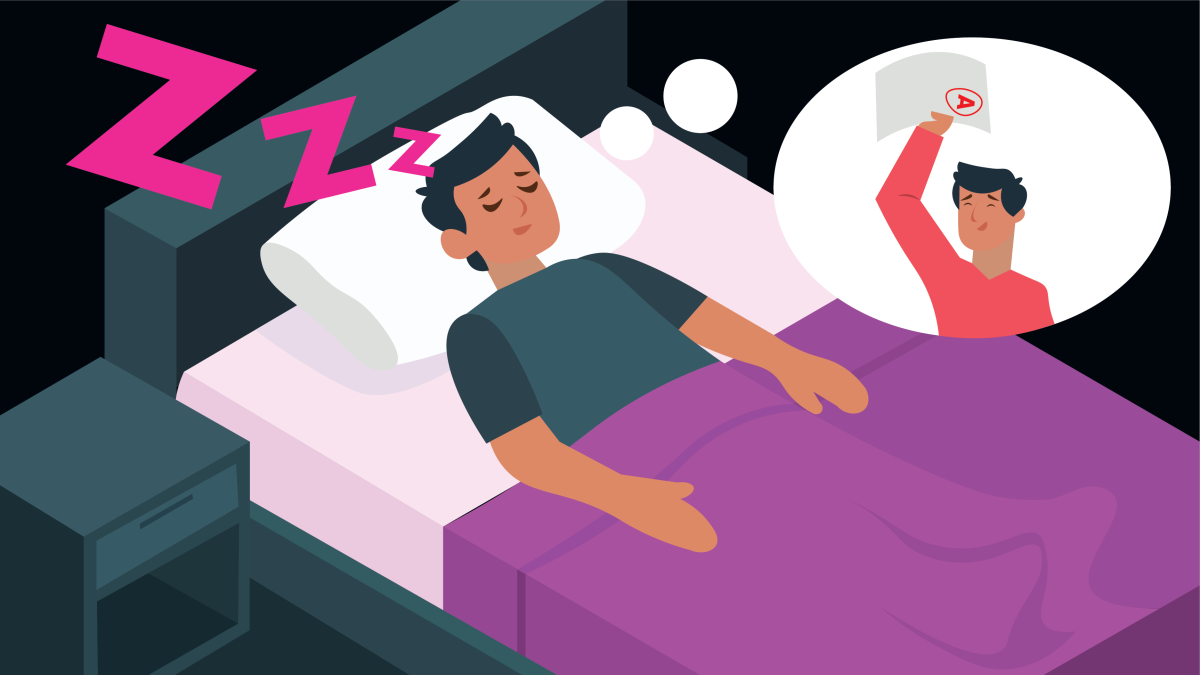When it comes to improving your grades, sometimes what you need and what you want is the same thing.
More sleep.
At least 60% of college students get poor-quality sleep, according to the Centers for Disease Control. Not sleeping or getting enough sleep can also lower your learning abilities by as much as 40%, according to the Sleep Foundation, a research organization.
It can be hard to get enough hours of sleep as a college student. Between juggling school, a social life and, for some, work, sleeping enough is sometimes pushed to the back burner.
But this can have detrimental consequences, not just physically but academically.
According to a study published in the proceedings of the National Academy of Sciences, losing one hour of sleep nightly can lead to a 0.7 decrease in end-of-term GPA. The recommended number of hours of sleep for a young adult is seven to nine. Not sleeping for the required amount of hours can have repercussions besides feeling tired the next day, as sleep debt is cumulative.
READ MORE: Zyndemic: New student health scourge or safe nicotine alternative?
Prioritizing sleep can make a difference in how you feel and perform academically. When you sleep, your brain filters information and decides what to keep and what to discard. It also clears up space for new information that it will learn the next day.
During the deep sleep stage, your brain stores valuable information from the day. If you stay up late studying and miss the stages of deep sleep, your brain may not retain all the information you’ve learned, and all that studying would be in vain.
Instead of staying up late studying, it’s in your best interest to get enough hours of sleep, even if that means fewer hours of study.
READ MORE: Opinion: When in doubt, scream it out
In the light sleep stage, your brain makes space to learn new information. If you wake up too early to study, your brain won’t have enough space for all this new information.
And during the REM stage, your brain processes and understands all this information. That means that without enough REM sleep, you won’t be able to understand everything you’ve learned and spent time studying.
But let’s be honest, sometimes the reason why we stay up late and don’t get enough sleep isn’t because we’re fervently studying. TikTok and Netflix are some of the common reasons why we sacrifice sleep.
Exposure to blue light, which is emitted by screens and LED lights, leading up to bedtime can hinder sleep, according to the Sleep Foundation. Blue light suppresses the release of melatonin in our bodies, which makes us feel drowsy and ready to sleep.
Avoiding blue light before bedtime is crucial to maintaining a healthy circadian rhythm, which is achieved when your sleep cycle is aligned with our environment’s daytime and nighttime.
Electronic devices should be turned off two to three hours before bedtime to mitigate the effects of blue light, according to the Sleep Foundation. Turning off LED lights and using orange or warm lights instead also reduces exposure to blue light as well as makes sure the room you sleep in is completely dark. You could also use an eye mask to block any light.
These habits can make a difference in sleep quality and help ensure that we actually fall asleep at bedtime. Having a good quality of sleep will not only affect your physical and mental health but also how you perform academically throughout the day.
So next time you’re considering pulling an all-nighter to study for your exam, try a good night’s sleep instead.
READ MORE: Demystifying Hill Memorial Library: New reading room opens to community
Isabella Albertini is a 23-year-old mass communication junior from Lima, Peru.





